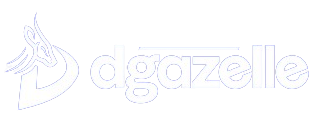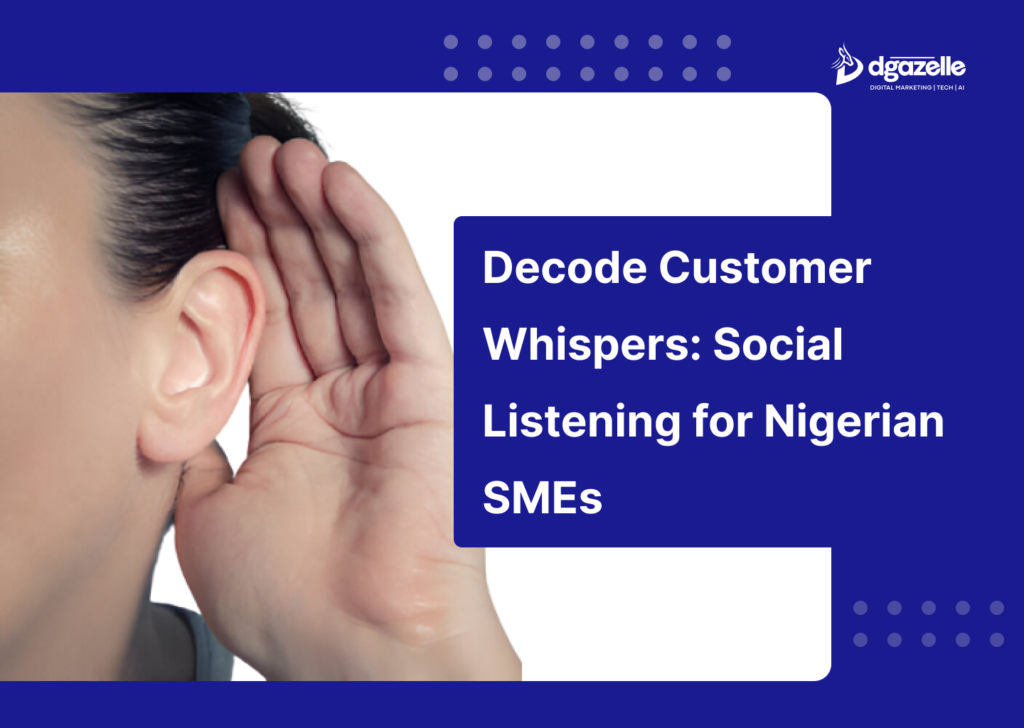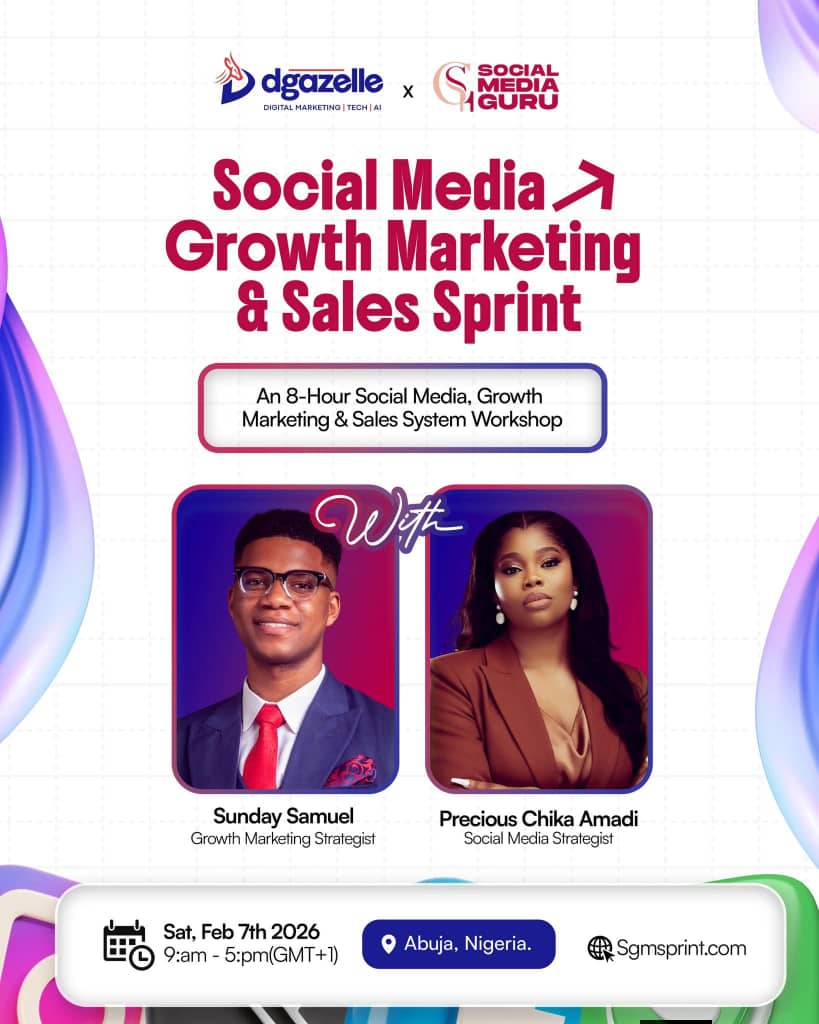Do You Ever Feel Like People Are Talking About Your Business? If so, you’re probably right. The thing is, not everyone who has a problem with your brand will tell you directly. In today’s digital age, consumers quickly voice their opinions about businesses—good or bad—on social media.
Bad customer experiences are costing businesses globally a staggering $3.7 trillion. But how do you know what your customers truly think if they don’t share it with you? That’s where social listening comes in.
By tracking online conversations and analyzing social data, Nigerian SMEs can tap into valuable insights to improve marketing strategies, customer experience, and product offerings. Let’s explore how you can leverage social listening to transform your business.
What Is Social Listening?
Social listening refers to tracking and analyzing social media content to detect mentions of your business, products, or industry trends. By using dedicated tools, businesses can convert raw social media data into actionable insights.
Social listening allows you to:
- Identify customer complaints and address issues before they escalate.
- Understand customer behavior and sentiment toward your brand.
- Monitor industry trends and competitors to stay ahead of the curve.
- Leverage social proof to enhance credibility and brand perception.
Unlike social monitoring, which focuses on real-time engagement and responses, social listening is about understanding the why behind customer conversations, making it a crucial component of long-term business strategy.
Social Listening vs. Social Monitoring: What’s the Difference?
Both social listening and social monitoring help businesses track online conversations, but they serve different purposes:
Social Monitoring: This involves tracking and responding to real-time mentions of your brand. For example, a Nigerian restaurant that sees a Twitter mention about their new jollof rice recipe may reply and thank the customer, but it doesn’t analyze the sentiment behind the mention.
Social Listening: Goes beyond responding to comments. The same restaurant could analyze hundreds of conversations about jollof rice, identify common themes (like spice preference), and adjust their menu accordingly.
While social monitoring keeps you engaged with your audience, social listening gives you the bigger picture to make informed business decisions.
Why Social Listening Matters for Nigerian SMEs
For small businesses in Nigeria, social listening is more than just a marketing tool—it’s a growth strategy. Here’s why:
- Understand Market Trends: By tracking relevant hashtags and industry discussions, SMEs can identify market shifts and position themselves strategically.
- Customer Feedback at Scale: Businesses can capture untagged mentions and indirect feedback, which is often missed through direct engagement.
- Improve Brand Perception: Understanding customer sentiment helps businesses address negative feedback proactively and strengthen their reputation.
- Gain Competitive Advantage: By monitoring competitors, SMEs can identify their weaknesses and capitalize on opportunities.
- Optimize Marketing Campaigns: Businesses can analyze which campaigns resonate most with their audience and refine their approach accordingly.
Turn Insights into Action! Discover what Nigerians are saying about your brand and optimize your marketing strategy. Get started now!
The Social Listening Process
To make the most of social listening, Nigerian SMEs need a structured approach:
- Define Your Audience & Platforms: Who are your customers, and where do they engage online? Instagram, Twitter, and Facebook are popular in Nigeria.
- Choose a Social Listening Tool: Consider tools like Sprout Social, AnswerThePublic, or Hootsuite.
- Identify Key Conversations: Look at common customer complaints, frequently asked questions, and trending topics.
- Set Your Objectives: Are you analyzing brand sentiment, tracking competitors, or measuring campaign success?
- Collect & Analyze Data: mentions, hashtags, and industry discussions to extract valuable insights.
- Take Action: Use findings to improve customer service, adjust pricing, or refine marketing messages.
Top Social Listening Tools for Nigerian SMEs
There are several tools available to help Nigerian businesses track online conversations. Some popular ones include:
- AnswerThePublic – Ideal for keyword research and topic discovery.
- Sprout Social – Offers robust analytics for sentiment analysis.
- Hootsuite – A great all-in-one tool for social media management.
- HubSpot – Provides marketing, sales, and customer support tools.
These tools help businesses gather and analyze data from platforms like Facebook, Twitter, and Instagram, making it easier to respond to customer feedback and industry trends.
Best Practices for Social Listening Success
To maximize the benefits of social listening, Nigerian SMEs should follow these best practices:
- Know Your Audience: Identify your ideal customer persona and focus on relevant platforms.
- Use Keywords & Hashtags: Track brand names, industry-specific terms, and trending hashtags.
- Differentiate Between Noise & Insights: Not all data is useful; focus on key trends and sentiment.
- Engage with Findings: Use social listening insights to refine customer service, content strategies, and business decisions.
- Monitor Competitors: Keep an eye on what’s working for competitors and adapt accordingly.
Conclusion
Social listening is a game-changer for Nigerian SMEs, helping businesses decode customer whispers and turn insights into action. By actively tracking online conversations, SMEs can improve brand reputation, optimize marketing strategies, and stay ahead of the competition.
Understanding what customers truly think about your business can mean the difference between thriving and struggling. Start leveraging social listening today to make smarter, data-driven decisions that drive business growth.
Struggling with Consistent Social Media? Dgazelle’s Got You Covered!
Leave the planning, posting, and engagement to us. Elevate your online presence effortlessly. Reach out and see the difference!








